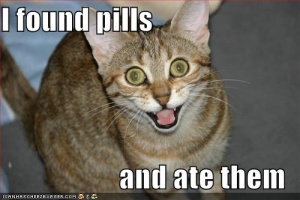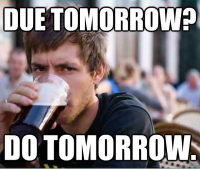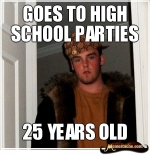Internet meme
Internet Memes are concepts that spread virally via the internet. They are user generated concepts that become ingrained in internet culture. These ideas or concepts evolve over time as the are transferred from person to person [1]. Memes can take the form of hyperlinks, pictures, websites, words, videos or sayings. They usually convey sarcastic or ironic phrases. Internet memes are spread across the internet through sharing, usually on sites such as 4chan, Reddit, Facebook, and can give rise to ethical issues including control, privacy and copyright.
Contents
Origin of the Word
Richard Dawkins first introduced the concept of a meme in his book The Selfish Gene: "Examples of memes are tunes, ideas, catch-phrases, clothes fashions, ways of making pots or of building arches. Just as genes propagate themselves in the gene pool by leaping from body to body via sperms or eggs, so memes propagate themselves in the meme pool by leaping from brain to brain via a process which, in the broad sense, can be called imitation. If a scientist hears, or reads about, a good idea, he passed it on to his colleagues and students. He mentions it in his articles and his lectures. If the idea catches on, it can be said to propagate itself, spreading from brain to brain. As my colleague N.K. Humphrey neatly summed up an earlier draft of this chapter: `... memes should be regarded as living structures, not just metaphorically but technically.(3) When you plant a fertile meme in my mind you literally parasitize my brain, turning it into a vehicle for the meme's propagation in just the way that a virus may parasitize the genetic mechanism of a host cell. And this isn't just a way of talking -- the meme for, say, "belief in life after death" is actually realized physically, millions of times over, as a structure in the nervous systems of individual men the world over."[2]
Analysis
Internet Memes in the Real World
Some internet memes grow so popular that they move offline. For example, the phrase "OMG" began as an abbreviation for "Oh, my God!" or "Oh, my Goodness!" in online comments and informal emails. However, the phrase has become more popular, and can now be heard in everyday speech.
Conversely, PostSecret, a community mail art project turned internet phenomenon, began offline before moving to a blog. Users send anonymous secrets on postcards to the creator of post secret, who posts images of these postcards on the site.[3]
Creation
Originally, many memes were sayings or jokes that became popular after circulating YouTube, Reddit, or Tumblr. However, currently, most memes are photos with overlaid text.
As internet memes grow more popular, websites have been created that focus on sharing them. One of these sites is QuickMeme, where users can choose from the images that have already been created and choose their own saying to overlay, or upload their own photo to make an entirely new meme. On the main page of the website, users can scroll through memes to view those that have been created. QuickMeme also has a voting systems that allow users to choose which memes they enjoy the most, and then filter memes based on their scores and popularity.[4]
Examples
Lolcats

A lolcat is one example of an internet meme, believed to have been started by users on 4chan. A lolcat depicts a cat and a humorous tagline. There are two common forms of lolcats:
- 1. An image of a cat bordered in black with a short tagline beneath the image.
- 2. An image of a cat with a short tagline at the top, bottom, or top and bottom of the image.
Lolcat memes frequently display a cat in an peculiar position or with an unusual expression. Similar memes have been created without a cat as the main focus and are referred to as 'lols'.
Planking
Planking is considered a "photo fad" meme, which involves lying face down with arms to the sides in unusual public spaces and then photographing the scene and sharing the image online. The planking phenomenon started when a pro-rugby player planked after a play during the match. Planking is also considered to be a successor to the phenomenon know as Lying Down Game and Playing Dead.[6]
"Y U NO" Guy
The "Y U NO" Guy meme is an image that is usually captioned with writing usually seen in text-messaging including shorthand, abbreviations, and carefree grammar. The meme us often used in a sarcastic tone, potentially used to mock those who text in aforementioned styles. [7]
Know Your Meme
Know Your Meme is not in itself an example of a meme but is a website that follows trends of memes and other online phenomena, such as viral videos and catchphrases in a continually evolving encyclopedic fashion. As of December 2012, the database contained more than 1300 entries that are confirmed memes [8]
Ethical Concerns
Control
One ethical concern of the Internet meme is the lack of control as it spreads online. The sarcastic nature of memes mean that some groups may take offense to them, but once memes have been spread online, it becomes impossible to remove them.[9]
Privacy
Some examples of popular internet memes are: Bad Luck Brian, Scumbag Steve and Good Guy Greg. The pictures used for these memes are actual people, which raises the issue of informed consent. In some cases, such as Ridiculously Photogenic Guy, the person depicted has adopted the meme as a part of their personality. Other times, the model will choose to ignore his or her viral fame, however, memes that have negative connotations attached to their image such as Bad Luck Brian and Scumbag Steve might be harder to deal with. The people depicted in these memes may be misrepresented or unfavorably portrayed, thus making it harder to deal with the infamy that comes from an unwelcome depiction of oneself.
Copyright
People frequently recycle memes by making edits to previously existing means. For example, many use the same image but add a new caption. The brings up questions of ownership and copyright. If someone takes ownership of a meme, reuse of the memes image, or alterations of the meme may be seen as plagiarism or copyright infringement.
Meme Sharing Sites
Some platforms like QuickMeme allow people to post advertisements between a cluster of memes. These advertisements usually take the form of thumbnails of the same size and dimension as the meme. Some argue that this forces the user to look at an ad, often without consent. Usually advertisements appear in corners of the screen, where they do not interfere with the user's activity, but in this case, it is more difficult to ignore advertisements.
References
- ↑ http://feedback.cheezburger.com/knowledgebase/articles/121815-what-is-a-meme-
- ↑ http://www.rubinghscience.org/memetics/dawkinsmemes.html
- ↑ Post Secret. Wikipedia. Retrieved 2011-12-11.
- ↑ http://www.quickmeme.com
- ↑ Lolcats
- ↑ http://knowyourmeme.com/memes/planking
- ↑ http://knowyourmeme.com/memes/y-u-no-guy
- ↑ http://en.wikipedia.org/wiki/Know_Your_Meme
- ↑ http://careermash.ca/blogs/memes-and-ethics-new-participatory-web
| ←Back • ↑Top of Page |




